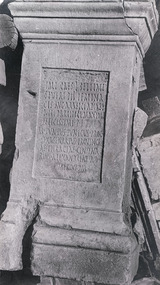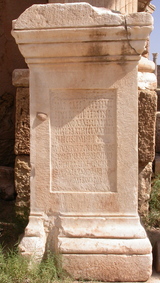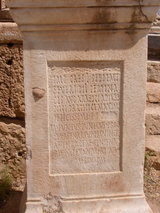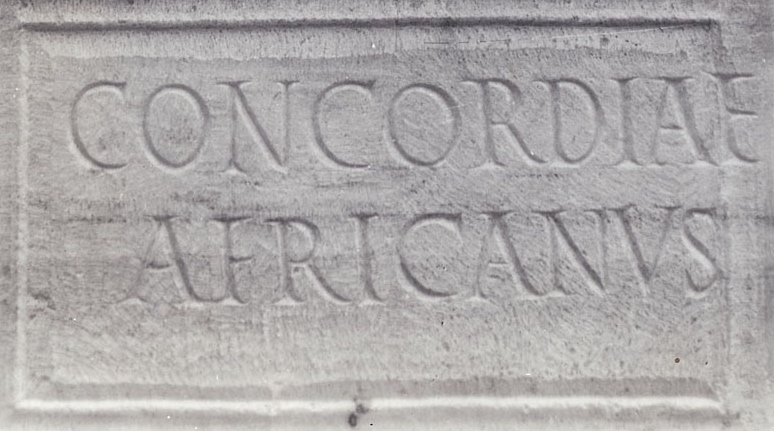Description: Moulded base made of marble
(w:
0.72 x h:
1.40 x d:
0.45). Uniform with 392, 403,
422.
Text: Inscribed on one face within a recessed panel
(die, w:
0.355 x h:
0.55).
Letters: Rustic capitals: 0.04-0.03.
Date: Between 10 Dec. CE 200 - 9 Dec. CE 201: dated from 422 (prosopography)
Findspot:
Lepcis Magna: Regio V,
Theatre, on the lower steps of the cavea, West side.
Original location: Unknown
Last recorded location:
Findspot
Interpretive
⟦P(ublio) Se[ptim]io Get[a]e C[ae]s(ari) ⟧
Imp(eratoris) Caes(aris) L(uci) Septimi
Seueri Pii Pertina-
cis Aug(usti) Arab(ici) Adiabe-
5nici Parthici maximi
felicissimi p(atris) p(atriae) ⟦filio⟧
M(arcus) Iunius Punicus proc(urator)
sexagenarius prouinci-
ae Thraciae centena-
10rius Alexandriae ad
Mercurium
Diplomatic
⟦PSE[....]IOGET[.]EC[..]S⟧
IMPCAESLSEPTIMI
SEUERIPIIPERTINA
CISAUGARABADIABE
5NICIPARTHICIMAXIMI
FELICISSIMIPP⟦FILIO⟧
MIUNIUSPUNICUSPROC
SEXAGENARIUSPROUINCI
AETHRACIAECENTENA
10RIUSALEXANDRIAEAD
MERCURIUM
English translation
Translation by: J. M. Reynolds
To Publius Septimius Geta Caesar (all erased) son of emperor Caesar Lucius Septimius Severus Pius Pertinax Augustus, victor in Arabia, victor in Adiabene, greatest victor
in Parthia, most fortunate, father of the country; Marcus Junius Punicus, imperial equestrian agent in Thrace at a salary
of sixty thousand sesterces, and in Alexandria at the Temple of Mercury, at a salary of one hundred thousand.
Bibliography: Caputo, 1940, 170 ff; IRT, 1952, 434, whence IRT, 2009, 434, whence EDH 059338; for BSR images see BSR Digital Collections.
Images
 Fig. 1
Fig. 1. View: Ward-Perkins Archive, BSR (Sopr. DLM 1216 Leica)
 Fig. 2
Fig. 2. View: Tantillo (2003)
 Fig. 3
Fig. 3. Face: Tantillo (2004)



